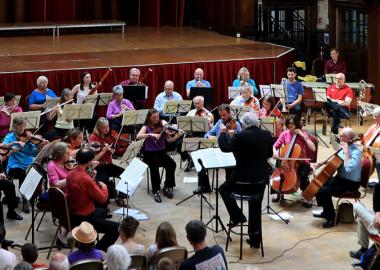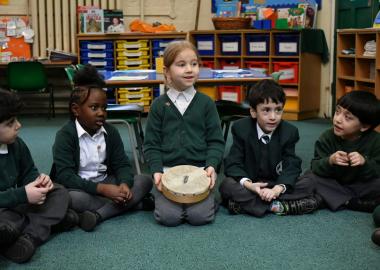This introduction is the first of three documents on Orchestra Tax Relief (OTR). It gives you an overview of what it is and how it works, and an overall idea if this is something your group would like to look into.
To help you decide we also have two additional documents –
- a decision making flow chart to decide if you qualify for OTR
- some example calculations to help you decide it will be financially worthwhile
If you decide that it is something that will benefit your group, go on to read:
Part 3: Keeping records, producing accounts & making a claim
Summary
- If your group plays concerts featuring 12 or more instrumentalists who are the main focus of the concert, then you can claim orchestral tax relief every year from HMRC.
- Making Music has analysed a number of member groups and estimated the net annually recurring OTR gains after additional costs to range from £1,300 for a group with annual concert production costs of £5,000 to £7,000 for a group with annual concert production costs of £34,000.
- To claim OTR Making Music recommends that your group sets up a limited company (templates and guidance provided free by Making Music) and sub-contracts concert production activities to that company (template for the sub-contracting agreement also provided free to members by Making Music). The production company then sends ‘elections’ in advance to HMRC to notify it of a series of forthcoming concerts that will attract OTR.
- At the end of its financial year, the production company completes its accounts and makes the OTR claim to HMRC in the form of a tax return. You can either do this yourselves or Making Music provides an inexpensive accounts checking and tax return/OTR claim service for your production company.
- If you think this is for you, please do not delay – set up the production company and make a contract with it as soon as possible. You then have considerable time before further work is needed!
- Making Music has extensively researched OTR and believes that for eligible groups the rewards of claiming OTR significantly outweigh the additional costs and admin. Furthermore, unlike other sources of funding, OTR will recur every year. Please read on for further details.
Content
- What is Orchestra Tax Relief?
- What are the criteria for a concert to be eligible?
- What concert costs are eligible for an OTR claim?
- How much money could my group get?
- How does OTR actually work?
- Will this be worth it for my group? Including examples
- How Making Music can help
- Example calculations
- Next steps
1. What is Orchestra Tax Relief?
Over a number of years since 2005, the government has introduced creative tax reliefs for film, high end & children’s TV production, animation, video games and theatre and museums & galleries.
These tax reliefs are state aid, intended to act as an incentive for the production of, in OTR’s case, orchestral concerts, with no ‘cultural test’: this money is not dependent on what is being produced, or where, or who the audiences are, or how technically able the musicians are, or how modern the composer. It is simply money to encourage the putting on of concerts. And amateur orchestras are specifically referenced in the legislation.
OTR is claimed via a corporate tax return that shows a loss. This loss is then ‘surrendered’ to HMRC, and you will receive a cheque in the post from them to cover that loss.
But what do you need to do to claim it, what costs are eligible and is it worth the effort for you?
2. What are the criteria for a concert to be eligible?
a) Is it an orchestral concert?
For the purposes of OTR, there are specific criteria defining an orchestral concert; it is a:
- Concert by an orchestra, ensemble, group or band;
- Consisting wholly or mainly of instrumentalists;
- Who are the primary focus of the concert
This means singers can be part of the concert, but not the primary focus (even if potentially outnumbering the instrumentalists). But a backing band is specifically referenced as NOT eligible. We are still in the process of exploring some of the orchestral/choral repertoire with HMRC, but Beethoven 9 = fine, Handel’s Messiah = not eligible.
The question to ask is: who are the audience coming to see?
If the answer is ‘the choir’, then it won’t qualify; if the answer is ‘a group of instrumentalists’ or ‘mainly a group of instrumentalists’, then very likely it will qualify.
In addition, it will not be eligible if:
- it is an event advertising/promoting goods/services
- it is a performance as part of a competition or contest
- making a recording is the main purpose of the event
b) Is it a qualifying orchestral concert?
If you have established that it is an orchestral concert under the above criteria you now need to decide if it is a qualifying orchestral concert; i.e. that it meets the criteria below and that you will therefore be entitled to claim OTR for its costs. To qualify:
The concert has to be:
- Live before a paying public:
- so free concerts = no
- concerts where audience just donate = no
- if one of those is your model, you might consider introducing a nominal charge
- OR For educational purposes;
- this means, for instance, the concert your group is doing in a prison, care home, school
- provided your group is not connected to the beneficiaries; so school concert by school pupils for school pupils or their parents only = no, even if parents pay
- but concert in a school charging for tickets and open to parents and the general public = yes
- AND 25% of expenditure is in the European Economic Area – we do not anticipate this will affect many groups. It is part of the legislation as it will affect professional orchestras who tour extensively. If you are claiming for concerts in the UK it should not affect you. If you are claiming for concerts abroad then you can contact us for more details. This has not been affected by Brexit.
The concert needs to feature:
- At least 12 instrumentalists. (Voice is not considered an instrument here; but otherwise all or any instruments are eligible: ukulele group; brass band; full symphony orchestra; string ensemble; flute choir, etc.)
- None or a minority of the instruments are directly amplified. (This means that general pick-up through microphones is fine - this is designed to exclude rock and pop bands, so directly amplified instruments means electric guitars etc. ‘Minority’ leaves the door open to weird and wonderful modern repertoire or inclusive orchestras where an otherwise acoustic group of instrumentalists might also include the odd electric bass or other directly amplified instrument.)
3. What concert costs are eligible for an OTR claim?
For costs to be eligible for OTR they must be directly incurred in producing the concert (e.g. rehearsal costs, music hire, conductor’s fee). However not all costs are eligible. See below for a list of exclusions:
- Actual performance costs: you can claim for rehearsal costs (up to and including the final rehearsal before the concert), but not concert costs themselves
- Marketing
- Financing
- Legal fees
- Storage
- Ordinary running costs (and infrastructure costs): so, for example, your group's general insurance throughout the year with Making Music is not eligible, but if you had to take out specific insurance for one of the concerts, e.g. to hire a grand piano, then that would count as a cost directly incurred in producing the concert and part (covering the period of time leading up to the concert) could be claimed for.
- Speculative expenditure on activities not involved with putting on the concert(s)
Apportionment:
Some costs will cover both the rehearsals and the concert. Those costs need to be apportioned on a ‘just, reasonable and consistent basis’. Only you can decide how best to implement this in your own case, but an example might be:
"Our conductor’s termly fee covers 11 rehearsals plus the final concert. We have therefore decided to apportion 11/12ths of their fee as qualifying expenditure for our OTR claim."
Once you have calculated which costs are eligible you can then claim for 80% of those. The actual OTR payment you receive will be 45% of that eligible amount.
4. How much money could my group get?
Once you have calculated which costs are eligible you can then claim for 80% of them. The standard OTR payment you receive will be 45% of that amount. However, there is a temporary uplift of 50% in place until 2024, which means you will get more money.
See Example calculation for more details on how much money you could get.
5. How does OTR actually work?
How do we get our money?
OTR is a tax relief which may be paid out by HMRC or used to reduce a corporation tax bill. To get the relief you have to submit a Company Tax return. That Company Tax return showing a loss which is ‘surrendered’ to HMRC, you will then receive a payment from HMRC of 50% of that loss as OTR.
You probably have two immediate concerns:
a). We don’t pay corporation tax
That doesn’t matter. The payment is not linked to having a corporation tax bill – you just need to submit a Company Tax return. Whilst unincorporated associations can do that, we have been advised by HMRC that only incorporated organisations will be able to claim OTR.
This means, if you’re unincorporated, you need to set up an organisation that is incorporated in order to claim OTR via a Company Tax return.
- Company limited by guarantee or by shares, a charitable company, a Charitable Incorporated Organisation (CIO, SCIO), a Community Interest Company etc) – can claim OTR
- Partnerships, trusts and unincorporated associations – can’t claim OTR.
Your group is most likely not incorporated (e.g. an unincorporated charity) and so would need to set up a separate incorporated production company which will in future produce your concerts and claim OTR. Even if your group is incorporated it is probably still easier to set up separate incorporated production company. N.B. this production company will not be a charity, whether or not your group, the parent organisation, is one.
More on this in ‘OTR Part 2 – Getting set up’.
b). We don’t make a loss on our concert
If your concert makes a profit on ticket sales, you can still claim OTR. The income from your concert (e.g. ticket sales etc.) goes to the parent organisation; the production company incurs all the costs and is paid a fee by the parent organisation to produce that concert. This arrangement will mean the production company will be able to surrender a loss to HMRC to claim OTR. Exactly how this process works is explained in more detail in OTR Part 2 - Getting set up
This structure is one recommended by HMRC. OTR is a way of disbursing state aid to the orchestral sector and the best ways to administer and claim this have been previously tested on Theatre Tax Relief (most similar) and other creative industry tax reliefs.
So what are Making Music proposing?
Our recommendation is that a member group who wish to set themselves up to be able to claim OTR:
- Forms a limited company (‘the production company’) to be the conduit through which OTR is claimed. For members who are already an incorporated member, the production company will become a subsidiary of the incorporated company. For unincorporated groups, the production company will be formed by key personnel in the parent organisation. We use the term ‘parent organisation’ to refer to your main group, the Making Music member group, whether incorporated or not.
- When a concert series has been planned, the parent organisation will enter into a contract with the production company (using the Making Music template) for it to produce the concert(s), paying it a fee to do so which will be the sum needed to pay for all concert costs minus the OTR income, so the concert costs are ultimately lower for the parent organisation.
Why do this and who is responsible for putting on the concert?
This is very important:
- The production company is responsible for producing the concert. As the parent organisation (the music group) you are contracting the company to do this for you.
- The production company is responsible for putting on the concert from start of the production process to the finish.
- It is actively engaged with the decision making in relation to the concert (hence our recommendation that production company personnel be key personnel from the parent organisation’s committee).
- It directly negotiates for, contracts for and pays for goods and services in relation to the concert.
- The production company therefore needs to be in place BEFORE you make the first contracts or payments in relation to a concert or series of concerts.
6. Will this be worth it for my group?
This depends on your group size and how much you spend on concert production. As a general rule of thumb we think:
- If your costs that qualify for OTR are £4K or above it may be worth it because…
- Taking other costs into account this would give you a net gain of over £1,000 at the moment with the 50% OTR rate.
- Once the OTR rate goes back down to 25% from 2024 the net gain would be around £550/year
This does have to be weighed against the extra administrative effort required to claim this money. However, once you have set up these new structures and ways of working, this will be money you can claim every year; and: Making Music is providing services to help you with all this. The extra work is:
- Setting up a production company; this would be a one-off activity.
- Running the production company itself, which does require a small amount of annual effort
- Having an annual contract between the parent organisation and the production company, for the production of your concerts
- Producing annual accounts for the production company (as well as the accounts you already produce for the parent organisation, your main group)
- Keeping the right information in order to make an OTR claim at the end of the financial year, including notes on apportionment, for instance.
"We are delighted to have just received our first payment from HMRC for Orchestra Tax Relief. We worked closely with Making Music on this- they provided us with training at the start of the process and hand-holding throughout. Hopefully, many other amateur orchestras will also take advantage of this welcome governmental support to amateur music."
David Smith, Ealing Symphony Orchestra
7. How Making Music can help
We are providing a range of services to help you get set up for claiming OTR and to actually make the claim:
FREE for members only:
- templates for setting up a production company & accompanying documents (one-off)
- contract template between the parent organisation and the production company (annual)
Chargeable service:
Our OTR claim service includes:
- A template document for keeping accounting and OTR records.
- Support producing year-end statutory accounts for your production company.
- Submitting accounts to Companies House on behalf of your production company.
- Compiling and submitting a Company Tax return and OTR claim on behalf of your production company.
The cost for the service is:
- 12% of the OTR payment you receive from HMRC
- That 12% figure will include VAT
- There is a minimum fee of £175
- There is no maximum fee, but we are happy to negotiate a fee cap for large OTR claims.
Example:
- You get £6,000 from HMRC. 12% of £6,000 = £720. Our fee is £720
- You get £2,500 from HMRC. 12% of £2,500 = £300. Our fee is £300
- You get £1,200 from HMRC. 12% of £1,200 = £144. Our fee is £175
(all prices include VAT)
Why would we need this service?
Our service is designed to help make the process of claiming OTR as simple and as cost effective as possible:
- The production company has to produce statutory annual accounts which are also needed to make the OTR claim. The OTR calculation, and how that affects your final accounts, is not simple. We are not a firm of accountants and so cannot do this for you; but we can give you templates and guidance and check the result for technical errors.
- We are a registered agent with HMRC which means we can compile and submit the Company Tax return and OTR claim to HMRC on your behalf. Small companies can submit a CTR using HMRC’s free software. However, this is not suitable for making an OTR claim which means you would have to purchase and maintain commercial tax software with annual costs typically up to £400.
We will not be providing this service for organisations with an income above £100k as they will be able to engage an accountancy firm to do this work for them or have appropriately qualified finance staff to produce such accounts.
Our service is geared towards smaller organisations and ensuring they can benefit from OTR. We aim to make the process of claiming OTR as simple as possible for treasurers who don’t have finance experience and as affordable as possible for groups who would find engaging professional accountancy services prohibitively expensive.
Please note: this service is for production companies, not for parent organisations.
Why are these services chargeable?
We have to engage appropriately qualified staff to provide these services and will need to recover that cost by charging – these services are too resource-intensive to be financed out of your general membership subscription fee. However, we will keep these fees as low as possible, only seeking to recoup our costs.
Who has produced the legal templates?
The templates for a Private Company Limited by Shares and accompanying documents as well as the template contract between your group and the production company have been created for us by legal firm Harbottle & Lewis for England and Wales.
We’re in Scotland/Northern Ireland – the law is different!
OTR applies in Scotland and Northern Ireland as well as England and Wales. We have commissioned legal firms in Scotland and Northern Ireland to adapt the documentation created for England & Wales to reflect the law in Scotland and Northern Ireland. Please make sure you use the correct templates and notes.
8. Example Calculations
We suggest you have a go, with the examples provided below, at analysing your group’s expenditure in the last financial year. Look at:
- cost directly incurred on the production of concerts
- minus the actual performance costs (using apportionment where appropriate)
- minus the marketing costs
Of the figure you come up with, 80% would be eligible core costs and your OTR claim would be 25% of that. But remember you would most likely have to pay us to submit the claim on your behalf. You may also have bank account charges to pay. We have used an average figure of £60/year – but they do vary from bank to bank so make sure you factor this in (there is more information on bank accounts in our 'Setting up a production company toolkit').
| All production costs: | £5,000 |
| Eligible OTR costs: | £4,000 |
| Qualifying costs (80% of eligible OTR costs): | £3,200 |
| OTR payment (50% of qualifying cost): | £1,600* |
| Bank account fees | -£60 |
| Companies house filling fee: | -£13 |
| MM OTR service: | -£192 |
| Total net gain: | £1,335 |
*50% rate in place until April 2025.
|
Total annual spend on concerts |
Annual costs eligible for OTR |
Qualifying costs (80% of eligible costs) |
OTR claim (50% of qualifying costs)* |
Net gain (OTR claim minus filing, bank & MM service costs) |
|
|
£34,177 |
£21,249 |
£16,999 |
£8,500* |
£7,407* |
|
|
£10,711 |
£ 8,284 |
£ 6,627 |
£3,314* |
£2,843* |
|
|
£7,261 |
£4,475 |
£3,580 |
£1,790* |
£1,502* |
|
|
£5,852 |
£4,324 |
£3,460 |
£1,730* |
£1,449* |
*based on 50% rate in place until April 2025. From April 2025 it will be 35%, and from April 2026 onwards it will be 25% .
9. Next steps:
Decide if OTR is for you and therefore if you need to set yourself up administratively so as to be able to claim it. To help you decide, go on to work through:
If you have decided that you are interested, then the next step is to go on to read:
- OTR, part 2: Getting set up (and associated toolkits: Setting up a production company and Running a production company and
We hope you find this Making Music resource useful. If you have any comments or suggestions about the guidance please contact us. Whilst every effort is made to ensure that the content of this guidance is accurate and up to date, Making Music do not warrant, nor accept any liability or responsibility for the completeness or accuracy of the content, or for any loss which may arise from reliance on the information contained in it.










